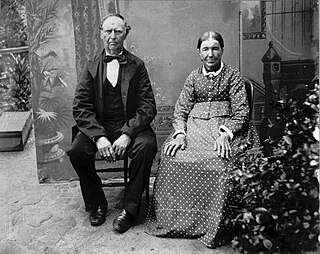Related Research Articles

Suriname, officially the Republic of Suriname, is a country in northern South America. It is bordered by the Atlantic Ocean to the north, French Guiana to the east, Guyana to the west, and Brazil to the south. At under 165,000 square kilometers, it is the smallest country in South America.

This is a demography of the population of Suriname, including population density, ethnicity, education level, health of the populace, economic status, religious affiliations, and other aspects of the population.
The economy of Suriname was largely dependent upon the exports of aluminium oxide and small amounts of aluminium produced from bauxite mined in the country. However, after the departure of Alcoa, the economy depended on the exports of crude oil and gold. Suriname was ranked the 124th safest investment destination in the world in the March 2011 Euromoney Country Risk rankings.
After the creation of the Statute of the Kingdom of the Netherlands, the Royal Netherlands Army was entrusted with the defence of Suriname, while the defence of the Netherlands Antilles was the responsibility of the Royal Netherlands Navy. The army set up a separate Netherlands Armed Forces in Suriname. Upon independence in 1975, this force was turned into the Surinamese Armed Forces. On February 25, 1980, a group of 15 non-commissioned officers and one junior officer, under the leadership of sergeant major Dési Bouterse, staged a coup d'état and overthrew the Government. Subsequently, the SKM was rebranded as the National Army.

The music of Suriname is known for kaseko music, and for having an Indo-Caribbean tradition.

The Suriname national football team represents Suriname in international football. The team is controlled by the Surinamese Football Association, which is a member of CONCACAF.

Anton de Kom University is the only university in Suriname. It is located in the capital, Paramaribo, and named for Anton de Kom, an anti-colonialist activist who was killed by the Nazis while in exile in the Netherlands.
Indo-Surinamese, Indian-Surinamese or Hindustani Surinamese are people of Indian origin who are nationals of Suriname with ancestry from India and the wider subcontinent. Their ancestors were Indian indentured workers brought by the Dutch and the British to the (then) Dutch colony of Suriname during the mid-19th to the early 20th century. Per the 2012 Census of Suriname, 148,443 citizens of Suriname are of Indo-Surinamese origin, constituting 27.4% of the total population, making them the largest ethnic group in Suriname on an individual level.
The SVB Eerste Divisie is the highest football championship for clubs run by the Surinaamse Voetbal Bond. The Topklasse is at the top of the system of Surinamese football championships. The league currently comprises twelve teams and operates a system of promotion and relegation. Seasons run from November to June of the next year, with teams playing 30 games in the regular season. The league was known as the Hoofdklasse but became Topklasse beginning with the 2016–17 season, and then from the 2017–18 season forward, the Eerste Divisie.

According to the official data, the Muslim population of Suriname represents about 13.9 percent of the country's total population as of 2012, which is the highest percentage of Muslims in the Americas. Though the majority belong to the Sunni sect of Islam, there are some Shi'a, and a small population of Ahmadiyyas.

Dutch Surinamese are Surinamese people of Dutch descent.

Surinamese people are people who identify with the country of Suriname. This connection may be residential, legal, historical or cultural. For most Surinamese, several of these connections exist and are collectively the source of their being Surinamese.
Chinese Surinamese people are Surinamese residents of ethnic Han Chinese origin. The earliest migrants came in the 19th century as indentured laborers; there was another wave of migration in the 1950s and 1960s. There were 7,885 Chinese in Suriname at the 2012 census, constituting 1.5% of the total population. They constitute the largest component of the 'other' ethnic category, which makes up 2.3% of the population as per the CIA World Factbook. The majority of the Chinese Surinamese consider Hakka of Guangdong as their ancestral homes. There is a small minority of Heshan, Jiangmen origin Cantonese and Hakkas as well.
Javanese Surinamese are an ethnic group of Javanese descent in Suriname. They have been present since the late 19th century, when their first members were selected as indentured laborers by the Dutch colonizers from the former Dutch East Indies.
Portuguese Surinamese people are Surinamese citizens of Portuguese ancestry.

As of 1 May 2023, most visitors wishing to enter Suriname may do so without a visa. However, visitors from some countries must first obtain a visa before being allowed into the country. Surinamese visas are documents issued with the stated goal of regulating and facilitating migratory flows. All visitors must hold a passport valid for 6 months.
Asian Surinamese people or Surinamese people of Asian descent, are Surinamese people whose ancestry lies within the continent of Asia.
White Surinamese or European Surinamese are Surinamese people whose ancestry lies within the continent of Europe.
Surinamese Americans are Americans of Surinamese descent. According to the 2000 U.S. Census, 2,833 people reported Surinamese ancestry.
Surinamese nationality law is regulated by the 1987 Constitution, the Allocation Agreement of 1975, and the 2014 Surinamese Nationality Law. It is highly influenced by Dutch law. These statutes determine who is, or is eligible to be, a citizen of Suriname. The legal means to acquire nationality, formal membership in a nation, differ from the relationship of rights and obligations between a national and the nation, known as citizenship. Surinamese nationality is typically obtained either under the rules of jus sanguinis, i.e. birth to at least one parent with Surinamese nationality; or on the principle of jus soli, i.e. by birth in Suriname. It can also be granted to a permanent resident who has lived in Suriname for a given period of time or by presidential decree through naturalization.
References
- G.A. de Bruijne J. Veltkamp, 2006, Libanese Surinamers, Leiden, ISBN 90-8167-555-9